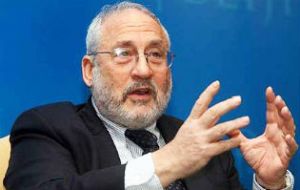MercoPress. South Atlantic News Agency
“Debt restructuring” and the Argentine case by Joseph Stiglitz
 “The vultures have invoked the rule of law but we should be clear: This is about greed”, says the Nobel Prize
“The vultures have invoked the rule of law but we should be clear: This is about greed”, says the Nobel Prize The following piece published in The New York Times was written by Joseph E. Stiglitz, winner of the Nobel Prize in Economics and a former chief economist of the World Bank, and currently a professor at Columbia University.
“The vulture funds — the small number of creditors who held out from Argentina's earlier debt restructuring -- had no interest in the country or its people. They picked up their bonds on the cheap, in hopes that by spending enough on litigation, they would eventually find a sympathetic judge who did not understand what was at issue and rule in their favor.
”All investors in sovereign bonds know that there is a risk of default — that's why the bonds can pay a far higher interest rate than U.S. bonds. But anyone buying bonds after a country announces a debt restructuring knows with virtual certainty that they will not be repaid in full without manipulating the legal system.
“The growing complexity of the market makes it harder for developing nations to free themselves of debt, increasing inequality worldwide.
”The vultures have invoked the rule of law but we should be clear: This is about greed. By arguing for an interpretation of the legal principle that all investors be treated the same — totally at odds from that which is traditionally ascribed to it by both economists and market participants — they have undermined the rule of law, and made debt restructuring almost impossible.
”Such restructurings are necessary for the market economy to work. But unfortunately, while we have a system to deal with private bankruptcy, we have no system for sovereign debt restructuring.
The International Monetary Fund proposed that we should have such a global system at the time of Argentina's default in 2001, and the United Nations Commission of Experts, of which I was the chairman, reiterated the call for such a system in 2009. The U.S. government vetoed the initiative. And now, the U.S. courts have made the problems far worse.
In the 1980s, when sovereign debts were mainly held by banks, restructurings could be done relatively smoothly. But with the growth of capital markets, these matters have become more difficult, as we have repeatedly witnessed. And with the growth of credit-default swaps and derivatives, they have become still worse.
The vultures may not even have an economic interest in a successful outcome. They could have insured themselves against a default; they could even make more money in the event of a default than without a default.
Avoiding default, by transferring money from Argentina — where the per capita income is around 14,800 dollars — to some billionaires will just create more inequality. But this is not just a question of fairness. The vultures have imposed enormous harm on global sovereign debt markets and on those countries whose well-being depends on them, especially in the emerging markets and developing countries.
This is not a zero sum game; it is a negative sum game, where the losses to the rest of the world will, in any case, far exceed whatever gains accrue to the vultures.




Top Comments
Disclaimer & comment rules-

-

-

Read all commentsThe obvious answer to that then is that 'the law' requires change. As I understand it has been in the UK.
Aug 02nd, 2014 - 09:51 am 0In the meantime Argentina 'signed on' for the subject bonds under one law and now does not like it TOUGH.
I further understand that a group of economists have written to the US Congress to try to start the alteration of 'the law' but in the meantime Argentina should abide by the law in effect at the time. However Argentina has a history of reneging on agreements treaties etc. so what else can one expect?
Greed it may be, but greed is what turns our world around and argentina plays its part too.....and its legal, tough sh*t Argentina you borrowed the money you are just paying what you owe at a discount don't forget.
Aug 02nd, 2014 - 10:14 am 0Yay to the K model working well isn't it?
Is this another Economist that appears to be agreeing with my previous stated views....?...;-)
Aug 02nd, 2014 - 10:28 am 0A Nobel prize winner for Economics and chief economist of the World bank....
I'm in such good company...
...his views appear to be slightly different to the Mercopress forum's chief Economist...Yankeeboy!!!
Whose views shall I respect.....? Nobel..or YB...Nobel or YB....I just can't make my mind up......Not!
“they would eventually find a sympathetic judge who did not understand what was at issue and rule in their favor.”
haha...telling it, like it is.....
...although I prefer...“Senile old bat that hasn't a clue what he's doing”
.....;-)))))
Commenting for this story is now closed.
If you have a Facebook account, become a fan and comment on our Facebook Page!